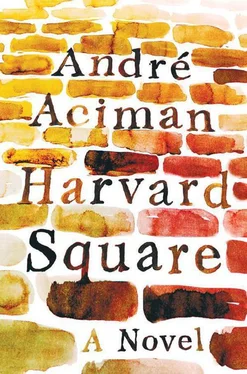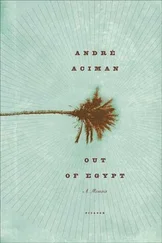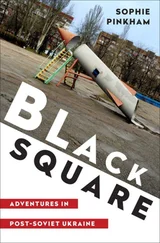For all his wrath and dislodged, nomadic life, he was of this planet, while I was never sure I belonged to it. He loved earth and understood people. Jostle him all you wanted, he would find his bearings soon enough, whereas I, without moving, was always out of place, forever withdrawn. If I seemed grounded, it was only because I didn’t budge. He was temporarily unhinged yet forever on the prowl; I was permanently motionless. If I moved at all, I did so like a straddler standing clueless on a wobbly raft in the rapids; the raft moved, the water moved, but I did not.
I envied him. I wanted to learn from him. He was a man. I wasn’t sure what I was. He was the voice, the missing link to my past, the person I might have grown up to be had life taken a different turn. He was savage; I’d been tamed, curbed. But if you took me and dunked me in a powerful solvent so that every habit I’d acquired in school and every concession made to America were stripped off my skin, then you might have found him, not me, and the blue Mediterranean would have burst on your beach the way he burst on the scene each day at Café Algiers.
In another country, another town, other times, I would never have turned to him, or he given me the time of day. I was not in the habit of approaching a complete stranger, would never have done so had I not seen something of me in him, something muted and forgotten in me that I recognized right away when it flared in his speech. His rants, for all their distorted, senseless dyspepsia, spoke to me, took me back to my past, the way Café Algiers took me back to something distant, unnamed, and overlooked in myself.
He, I would soon find out, was the only other human being in Cambridge who not only had not seen Star Wars but who refused to, who deplored it, who scorned the cult that had suddenly sprouted around it that summer. Obi-Wan Kenobi and Darth Vader and Luke Skywalker were on everyone’s lips as though they were familiar characters in a Shakespeare play, with R2-D2 and C-3PO trailing like minor fools and obsequious courtiers. But for Kalaj, it stood for all that was jumbo-ersatz.
ONE OF THE things that drew me to Kalaj at first had nothing to do with his mischievous sixth sense, or his survivor’s instincts, or his cantankerous outbursts that had strange ways of wrapping their arms around you till they choked you before they turned into laughter. Nor was it the mock-abrasive intimacy which put so many off but was precisely what felt so familiar to me, because it brought to mind those instant friendships of my childhood, when one insult about your mother followed by another about mine could bind two ten-year-olds for a lifetime.
Perhaps he was a stand-in for who I was, a primitive version of the me I’d lost track of and sloughed off living in America. My shadow self, my picture of Dorian Gray, my mad brother in the attic, my Mr. Hyde, my very, very rough draft. Me unmasked, unchained, unleashed, unfinished: me untrammeled, me in rags, me enraged. Me without books, without finish, without a green card. Me with a Kalashnikov.
If I liked listening to him, it was not because I believed or even respected the stuff he mouthed off every day at Café Algiers, but because there was something in the timbre and inflection of his words that seemed to rummage through a clutter of ancestral fragments to remind me of the person I may have been born to be but had not become. If I didn’t take his daily rants against America seriously, it was because it was never really America he was inveighing against, nor was his the voice of a bewildered Middle East trying to fend off a decaying and implacable West. What I heard instead was the raspy, wheezing, threatened voice of an older order of mankind, older ways of being human, raging, raging against the tide of something new that had the semblance and behavior of humanity but really wasn’t. It was not a clash of civilizations or of values or of cultures; it was a question of which organ, which chamber of the heart, which one of its dear five senses would humanity cut off to join modernity.
Which is why he said he hated nectarines. Brugnons , in French. People were being nectarized , sweet without kindness, all the right feelings but none of the heart, engineered, stitched, C-sectioned, but never once really born — the head part plum, the ass part peach, and balls the size of Raisinets. The nectarine didn’t have a single living relative in the kingdom of fruit. It was all graft.
“Grafted like us, you mean?” I said to him one day at Café Algiers after I’d heard him go on and on about President Carter’s nectarined face, to say nothing of his smile. The face, I agreed, was pure nectarine. But were we any better? We were no more authentic than anyone else, and we, having lived on three continents, were pure graft.
“Yes, I suppose like you and me,” he conceded. But a moment later: “No, not like you and me. The nectarine thinks it is a fruit. It doesn’t know it’s not natural and won’t believe it however hard you argue. And to prove it, it can even have children, the way robots too will have children of their own one day.”
He suddenly looked pensive, almost sad.
“You don’t know you’re human until you have children.”
Where did he come up with such notions?
“Do you have children?” I asked.
“I don’t have children.”
“Then?” I was teasing him
“I have my skin. That’s all.” And again, as he had done the first day I met him, he pinched the skin on his forearm. “This. This is my proof. The color of the ground in my country, the color of wheat. But,” he added as though on second thought — because there was always a second thought to everything he said—“I would have liked a child.”
All this was spoken out loud in French the better to intrigue a woman sitting next to our table who was probably wondering whether she was a nectarine herself, hoping that she wasn’t, all the while trying to guess what kind of a lover this strange rogue-preacher was in bed.
Which was exactly the purpose of the whole diatribe.
And yet, what finally cemented our friendship from the very start was our love of France and of the French language, or, better yet, of the idea of France — because real France we no longer had much use for, nor it for us. We nursed this love like a guilty secret, because we couldn’t undo it, didn’t trust it, didn’t even want to dignify it with the name of love. But it hovered over our lives like a fraught and tired heirloom that dated back to our respective childhoods in colonial North Africa. Perhaps it wasn’t even France, or the romance of France we loved; perhaps France was the nickname we gave our desperate reach for something firm in our lives — and for both of us the past was the firmest thing we had to hold on to, and the past in both cases was written in French.
Every night, in the bars and coffeehouses of Cambridge, we’d seek each other out, sit together, and for an hour or so speak in French of the France we’d both loved and lost. He was in Cambridge because he was running away from debt, from alimony, from who knows what ill-fated scrapes and illicit ventures he’d gotten himself mixed up in in France. I was in Cambridge because I still hadn’t found the courage to pack up and try to make France my home. We were, when we eventually ran into each other every night, the closest the other would ever get to France. Even the skittish intensity of his tidbit notions plucked from working-class cafés on rue Mouffetard and transposed to the dim-lit bar Casablanca kept the illusion afloat. Until last call. Last call made things more urgent, more desperate, for when they turned on the lights and we finally walked out of the bar to face a deserted Brattle Street, we already presaged the sobering realization yet again that night, as always at night, that this was not France, was never going to be, that this was all wrong, would always be, that France itself was just as wrong, because we were wrong everywhere, here, as in France, as in our respective birthplace that no longer was our homeland. We blamed Cambridge for not being Paris, the way over the years I’ve blamed many places for not being Cambridge, which is like blaming someone for not being someone else or for not living up to who they never claimed they were.
Читать дальше












